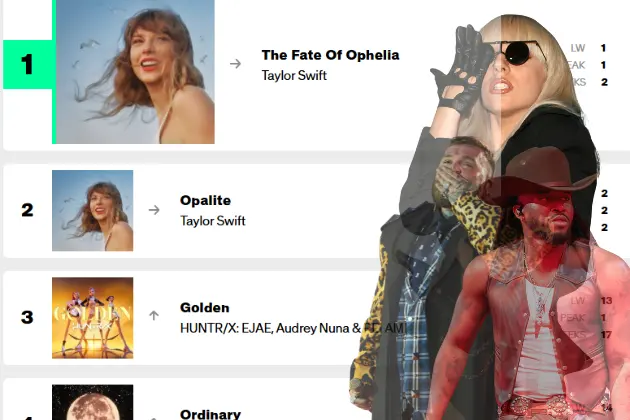Copyright falkirkherald

A new rule implemented by Billboard has seen a ‘cull’ of some of the most popular songs on the Hot 100.The move comes as the chart system looks to be revamped regarding its ‘Recurrent Rule.’It means acts that have had months in the chart, including Lady Gaga and Sabrina Carpenter, have all vanished from it. Your favourite songs of a few months ago may suddenly find themselves no longer on the Billboard Hot 100 - including the incredibly popular collaboration between Lady Gaga and Bruno Mars. Their song, ‘Die With A Smile,’ is one of those tracks hit in the immediate fallout of Billboard's aggressive move to overhaul the chart's integrity. For over a year, the superstar duet had been a fixture in the Hot 100's upper echelons, showcasing the phenomenal longevity streaming offers established hits. However, after the chart was completely reshuffled by the debut of Taylor Swift's latest album, The Life of a Showgirl—an event which pushed ‘Die With a Smile’ down to No. 22—Billboard enacted a new, stricter ‘Recurrent Rule.’ The powerful change is designed to end the long reign of older smashes, forcibly clearing out the chart and confirming the music industry’s commitment to combating the ‘stagnation crisis’ of the streaming era. What is the rule change Billboard is now enforcing? Billboard is enforcing a major update to its Recurrent Rule, the policy designed to clear older songs from the Hot 100 to make room for new music. The rule was updated because the original criteria were failing to filter out long-running streaming hits, leading to chart stagnation. The new rules drastically tighten the longevity thresholds, causing an immediate exodus of songs like "Die With a Smile." A song is now forcibly removed from the Hot 100 if it meets any of these new benchmarks: It falls below No. 5 after 78 weeks (a year and a half) on the chart.It falls below No. 10 after 52 weeks (one year) on the chart.It falls below No. 25 after 26 weeks (six months) on the chart.The original rule of falling below No. 50 after 20 weeks remains in place. Lady Gaga and Bruno Mars' duet was caught by the new ‘No. 10 after 52 weeks’ rule; despite still maintaining a position at No. 22 (pushed down by Taylor Swift’s album entry), the song had been on the chart long enough to be deemed recurrent and removed. Why is Billboard making this rule change now? The change is a direct response to the streaming era's ‘stagnation crisis’ on the Hot 100. Historically, hits would rise and fall relatively quickly, driven by physical sales and shifting radio playlists. In the modern landscape, streaming services often prioritise familiar songs users already listen to, creating an algorithmic feedback loop that keeps popular hits generating enormous numbers for months or even years. This allowed songs like Teddy Swims’ ‘Lose Control’ to linger for over two years. These multi-year runs, coupled with highly successful recent singles like Shaboozey's ‘A Bar Song (Tipsy)’, which tied the record for weeks at No. 1, made the chart visually static. The Hot 100 no longer accurately reflected new music that was catching fire, making it less useful for industry executives and less exciting for chart watchers. The final trigger was the dominance of massive album bombs. When Taylor Swift released her latest album, every single song launched into the highest tiers, pushing everything else—including ‘Die With a Smile’—down the chart. Billboard responded by immediately implementing the new, aggressive rules to ensure that future album bombs, or ‘chartstorming,’ don't just push hits down, but push old hits off completely. The change is intended to make the chart more dynamic and representative of what is currently trending, not just what is continuing to be streamed. What other musicians and their songs could be affected by the rule change? The chart purge was immediate and widespread, with early reports indicating at least ten established hits were wiped from the Hot 100 this week. The musicians most affected are those who rely on high, sustained streaming totals: Teddy Swims – Lose Control: This was arguably the biggest casualty. Despite still being highly popular, the song's run of 112 weeks (over two years) was immediately ended by the new long-term thresholds. Benson Boone – Beautiful Things: This huge hit was pulled after charting for roughly 89 weeks, having been highly resistant to falling down the ranking throughout the year. Morgan Wallen: Several of the country star's long-running album tracks and singles, which are known for their extreme chart longevity, were likely forced into recurrent status. His continuous presence in the lower regions of the chart was a major point of discussion before the rule change. Shaboozey – A Bar Song (Tipsy): While this song's run at number one recently concluded, its unparalleled longevity (tying the all-time No. 1 record) made it exactly the type of record the new recurrent system is designed to prevent from lingering for a second or third year. Will the Official UK Top 40 Chart follow suit? There is little risk of the UK's Official Singles Chart (OCC) adopting Billboard's new, stricter recurrent rules because the OCC already implemented its own radical solution to chart stagnation years ago. Unlike the US, the UK system was forced to change early to combat the very phenomena that Billboard is only now attempting to fix, establishing much more aggressive mechanisms to manage both the longevity of hits and album chart domination. The central component of the UK's defence against stagnancy is the Accelerated Chart Ratio (ACR) system, introduced in 2017. ACR immediately limits the chart power of older songs by halving a song’s stream-to-sale ratio once it is deemed "past its peak" or declining. Furthermore, the OCC applies a "Permanent ACR" to any track older than three years, effectively banishing classic hits to the chart's lower reaches. This is designed to reduce the power of so-called "evergreen" tracks, which maintain high stream counts long after their commercial peak. Crucially, the UK chart already prevents the ‘chartstorming’ phenomenon—such as the one recently created by Taylor Swift in the US—from ever happening. The Three-Song Rule, introduced in 2017 following a period where Ed Sheeran's Divide album occupied 16 of the Top 20 spots, limits any lead artist to only three songs simultaneously charting in the Top 100. This single rule prevents major artists from wiping out the chart's integrity and ensures the ranking remains a showcase for a diverse array of new talent. Ultimately, the OCC is generally ahead of the curve, having already survived and corrected the chart crises that the new Billboard rules are just now attempting to address.



